Rahab and Tamar
In 1998, twenty thousand American middle and high school students were surveyed regarding their personal ethics. The results were disconcerting, to say the least. Although 97 percent considered it important to be a person of good character, 30 percent admitted they had stolen something the previous year. Sixty-two percent confessed to cheating on a test; and 83 percent acknowledged lying to a parent or teacher.
In fact, more than one-third said they lied on the survey. Yet, according to the “1998 Report Card on the Ethics of American Youth” cited by the Josepheson Institute of Ethics, 91 percent were, nevertheless, satisfied with their personal ethics and character.1
Evidently many young Americans feel that doing the right thing is good, but doing the wrong thing is also good when expedient.
Two Gentile women included in the genealogy of Jesus the Messiah direct contrast to the modern code of situation ethics. One did what she knew was right, despite an environment of paganism and duplicity. The other put feet to her faith in the only true and living God. Who were these women, and how did they end up in the physical line of the Messiah?
Their names are recorded for eternity in Matthew’s genealogy of Jesus. “And Judah begot Perez and Zerah of Tamar; . . . And Salmon begot Boaz of Rahab” (Mt. 1:3, 5).
Righteous Tamar
The story of Tamar and her father-in-law, Judah, is found in Genesis 38. Judah, Jacob’s son, had married a Canaanite woman who bore him three boys—Er, Onan, and Shelah. When Er grew up, Judah chose a wife for him.
Her name was Tamar (“palm tree”). Scripture does not say much about this woman of integrity. Apparently she was not Jewish, for she was not a descendant of Abraham, Isaac, and Jacob. Nonetheless, what stands out most about her life is her character, not her lineage.
Tamar’s marriage to Er ended abruptly: “And Er, Judah’s firstborn, was wicked in the sight of the LORD; and the LORD slew him” (38:7). Tamar was left childless.
Judah then commanded his second son, Onan, to marry Tamar and have children on behalf of Er. This was commonly referred to as a levirate marriage (Dt. 25:5–6). A man would marry his brother’s childless widow and have a son by her. The child would then be considered the son of the deceased brother, thus ensuring a continuation of the family line.
Onan obeyed his father—partially. He married Tamar; but because he knew the child would not be his, he took precautions to guarantee she would not conceive. The Hebrew text indicates that he did so repeatedly. “And the thing which he did displeased the LORD: wherefore he slew him also” (Gen. 38:10). Judah now had lost two sons. Fearing he might lose a third, he told Tamar to remain a widow and wait until Shelah grew up, at which time Shelah would take her as a wife.
Tamar obeyed. The Bible does not say how many years she waited; but after a considerable time, Shelah grew up. It became apparent to Tamar that her father-in-law had no intention of marrying him to her.
At that point, Tamar faced an ethical dilemma. Should she acquiesce to the moral degeneracy evidenced by Er, Onan, and Judah and just forget the whole thing—perhaps even marry into a completely different family? Or should she take matters into her own hands and do the right thing by trying to perpetuate Er’s family line? She chose the latter.
Having heard that Judah had become a widower, she deceived him into believing she was a prostitute. Not recognizing her, Judah requested her services and paid her with his signet ring, bracelets, and staff (38:18). These were symbols of authority and marks of identification. He gave her these as a deposit, intending to pay her with a goat later. But when Judah sent a Canaanite friend back with the goat and instructions to retrieve his belongings, the woman could not be found. In fact, nobody had even heard of her. Much to Judah’s chagrin, he had to let the whole matter go, “lest we be shamed” (38:23).
Three months later, Judah learned Tamar was pregnant. Since she was a widow and unmarried, everyone assumed she had acted immorally. Judah’s judgment was severe and to the point: “Bring her forth, and let her be burned” (38:24).
But when Tamar arrived, Judah had a surprise waiting for him. “By the man, whose these are, am I with child: and she said, Discern, I pray thee, whose are these, the signet, and bracelets, and staff” (38:25).
Judah was caught red-handed. It was a shameful moment, reminiscent of a later scene between King David and Nathan the prophet following David’s sin with Bath-sheba (2 Sam. 12:1–14). Like David, Judah had been quick to pronounce judgment on someone else until he was confronted with his own sin. To his credit, however, he acknowledged Tamar’s virtue and the error of his own ways. “She hath been more righteous than I; because that I gave her not to Shelah, my son” (38:26). Judah released Tamar and did not have relations with her again.
For her righteous stand, God blessed her and gave her not one son, but twin sons—Perez and Zerah. In fact, the name of Perez became great in Israel and was later invoked as a channel of blessing in the book of Ruth: “And all the people who were in the gate, and the elders, said, . . . let thy house be like the house of Perez, whom Tamar bore unto Judah” (Ruth 4:11–12). Most significantly, through the ancestry of Tamar and Perez, the Messianic line continued, culminating with Jesus Himself (Lk. 3:23, 33)—a noble reward for a young girl who stood for what was right.
Faithful Rahab
“And Salmon begot Boaz of Rahab” (Mt. 1:5). Rahab’s story is found in the book of Joshua. In chapter 2, the children of Israel were ready to cross the Jordan River into the Promised Land of Canaan. God had been patient with the Canaanites for more than six hundred years. As He had told Abraham, “the iniquity of the Amorites is not yet full” (Gen. 15:16). But now it was judgment day, and Israel was going to be the sword in God’s hand.
With the great walled city of Jericho looming before him, Joshua sent two young men on a reconnaissance mission. They entered the city and lodged in the home of a harlot named Rahab.
As with Tamar, the Bible does not go into Rahab’s background. She obviously was not Jewish, but Canaanite. God abhorred the Canaanites because of their abominations (Lev. 20:23). Along with polytheism, they practiced incest, adultery, homosexuality, bestiality, child sacrifice, witchcraft, necromancy (conjuring up the spirits of the dead), and sorcery (Lev. 18; Dt. 18:9–14). Their wickedness, in fact, had become so great that now God was ready to utterly destroy them. The fact that she grew up in a corrupted culture such as this makes Rahab’s story and her display of faith in the God of Israel all the more remarkable.
Rahab’s testimony is a wonderful illustration of how a person comes to saving faith. First she heard about God and His great deeds (Josh. 2:10). Then she believed in the Lord (Josh. 2:9). Afterward, she gave a verbal confession of her faith: “for the LORD your God, he is God in heaven above, and in earth beneath” (Josh. 2:11).
When the king of Jericho sent messengers demanding Rahab turn over the spies, she told them the spies had already left. In actuality, she had hidden them on her roof under stalks of flax. Like Corrie ten Boom, who, thousands of years later hid Jewish people from the Nazis during World War II, Rahab was a believing Gentile who protected the lives of God’s Chosen People in their time of need.
So deep was her faith in the God of Israel that she knew the Israelites would conquer Jericho and asked the spies to spare her and her relatives. The two spies agreed, and Rahab helped them escape through her window over the city wall.
This action proved the genuineness of her faith. As the apostle James put it, “In like manner also was not Rahab, the harlot, justified by works, when she had received the messengers, and had sent them out another way?” (Jas. 2:25). James did not say Rahab was justified (declared righteous) by her works in the sight of God. God sees the heart and justifies people solely on the basis of faith (Rom. 4:1— 5:1). But her actions justified her in the sight of men, because the only way men can see the reality of someone’s faith is when they see the works of faith (Jas. 2:18).
Later, when the Lord destroyed Jericho, Joshua and the two spies kept their word. “And Joshua saved Rahab, the harlot, alive, and her father’s household, and all that she had” (Josh. 6:25). Rahab could have been content with just her own deliverance. Instead, between the time the spies left her house and the fall of Jericho, she evidently witnessed to her family and gathered them under her roof, so the God of Israel would protect them. Rahab is a timeless example of a woman who was saved by God’s grace through faith.
“By faith the harlot, Rahab, perished not with them that believed not, when she had received the spies with peace” (Heb. 11:31). God not only spared Rahab’s life, but He also rewarded this Gentile woman in other ways. She later married Salmon, a Jewish leader from the tribe of Judah (and direct descendant of Tamar); and she became King David’s great-great-grandmother. Through Salmon, the Lord gave Rahab the greatest honor of all—she was placed in the direct line of Jesus the Messiah.
By today’s standards, Tamar and Rahab had little to recommend them. Neither had power, possessions, or prestige—elements the modern world considers so necessary to succeed. But what they did have was more important. They had character, faith, and the courage to act on their personal convictions. They were not merely hearers of the Word. They were doers (Jas. 1:22). And God rewarded them for it, both temporally and eternally.
In December 1999, the Gallup organization took its annual religion poll. Eighty-eight percent surveyed said they considered religion important in their lives; 86 percent expressed a belief in God. But 45 percent said they care more about their own views and those of others than they do God and religious teaching.
And when asked if their religion was the best path to God, 82 percent said they believed other religions were equally as good.2
In the midst of an American culture that is rapidly realigning with Canaan—or as one writer put it, “slouching towards Gomorrah”—we must ask ourselves this question: Are we willing, as Tamar and Rahab were, to do what is right and live by faith, even if we don’t see the rewards in this lifetime?
The generation that follows us will certainly be looking for our answer.
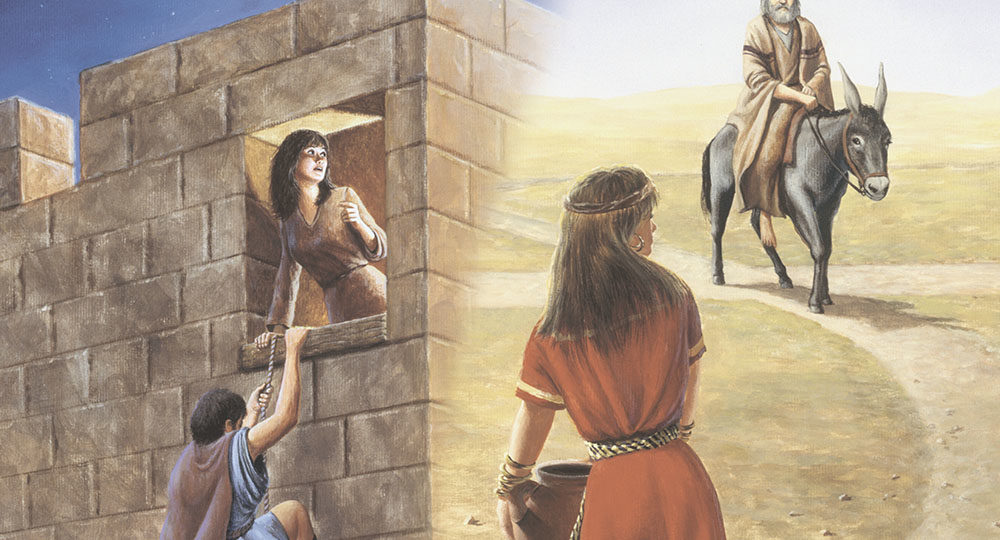
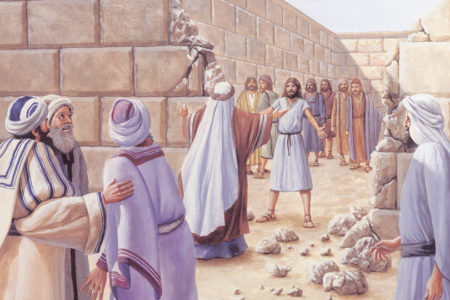
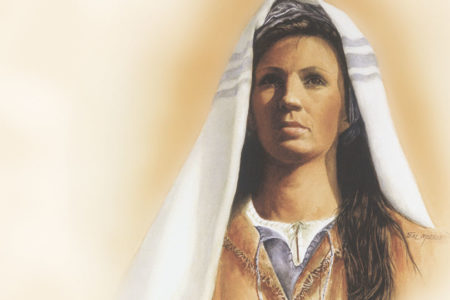
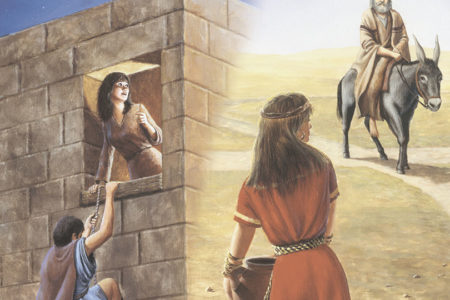

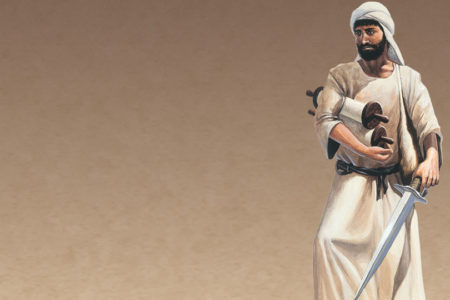

Motivational and helps me to be like them, doing what is right.
Great content. Concepts about faith and works and that God sees our hearts well explained.